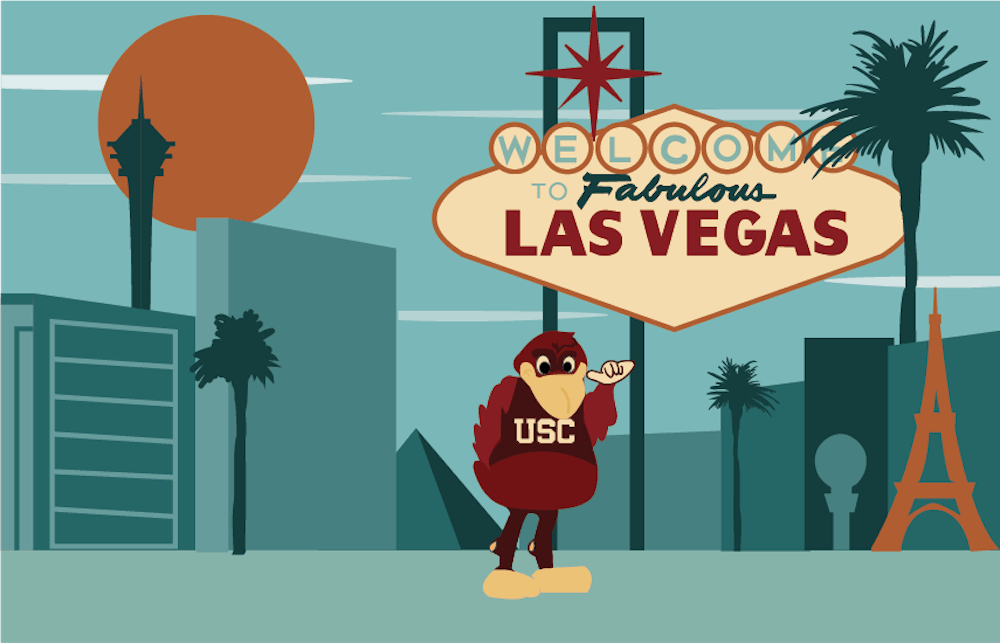One student at the University of South Carolina is looking to secure a seat at the World Series of Poker in October.
The tournament requires a $10,000 buy-in, and the first place prize is over $6 million, according to this Gamecock, who wished to remain anonymous.
His gambling aspirations were born during basement poker games, according to his lifelong best friend. The student recalls being around 12 years old when his friend introduced him to his first game.
As the whole group kept improving, the buy-in steadily increased, beginning at $10 and peaking at $100.
“A lot of kids like to work out, watch sports or go out to dinner,” the student said. “Our kind of release was gambling.”
Professional poker playing requires travel, but his budget and classes limit opportunities to compete. During school, he bets on sports.
Sports betting is an accessible and simpler form of gambling. The majority of people betting on sports are men, and about 45 percent are ages 23 to 34, according to a study by Provoke Media.
“I was so so shocked at how many kids were betting,” the student said, accustomed to his hometown where “pretty much just my friend group bet.”
Another student, who also wished to remain anonymous, deep in the sports betting world has a similar story, as a friend from his senior year of high school told him “this is a good way to make a little money if you know what you’re doing.” He said he quickly “got hooked that way.”
The student interested in the World Series of Poker and his friends did not begin sports betting until their freshman year of high school. They started by making straight bets on games, recording their bets through a group chat.
They eventually started using sports books to bet on odds rather than simply just betting amongst themselves. This practice is completely legal even in states where sports betting websites are not, as long as proper taxes are filed, the student said.
Sports betting now allows the entire group to bet together, despite being dispersed throughout the country. The group developed the saying: “we bet as a family."
“We would all win together, we would all lose together,” he said, which brings the group even closer and keeps them connected to this day.
Sports betting in itself is a social game. “It can really bring people together,” he said, “sure it can tear friends apart, but I think for the most part it brings people together. But it’s a weird way to unite and connect people.”
While poker is his preferred game — and one he says he’s better at — he has made significantly more money on sports books. His estimated earnings playing poker are about $5,000, but he has earned “eight to nine times that much” on sports.
A significant sum of his career winnings came from “an absolute heater,” he said. During this hot streak he “made a working man’s yearly salary in three months.”
“When the cards are hot you ride the hot hand,” he said, using a poker analogy to talk about how he and his friends work together on sports betting. The “hot hand” stayed on fire and the entire group benefited.
Following this large influx of money, he invested 25% of the profits into the stock market, 25% back into gambling and gave the last 50% to his dad to set aside.
He threw down $25 to $35 on a weekly touchdown scored parlay last NFL season, which means he selected a player from every game and each of those players had to score a touchdown for him to collect anything.
The players delivered, resulting in a profit around $7,500. He said it was “one of the coolest things ever, just because I risked so little and won so much.”
His winnings have allowed for some lifestyle changes, such as nicer clothes, fancy food and even a new car.
“It’s work hard, play hard,” he said, but he does realize it may not be sustainable, saying “when you lose, you’ve got to change it back" and rebuild.
Support from his parents and friends are key to mentally overcoming major losses. He described one significant loss that occurred the same day of an exam. He said his frustrations made it nearly impossible to focus. He no longer takes bets when he has exams scheduled.
In addition, his “eating habits” and sleep patterns have both been impacted. His best friend described similar struggles, particularly after a loss, and said, “you don’t go insane, but you lose your sanity.”
These losing streaks can lead to a cycle of “chasing,” which the Gamecock student said happens when gamblers attempt to “double or triple" their bets to try to win the money back.
The exhilaration from the chase “clouds your judgement” and can lead to ill-advised bets, he continued.
While it is filled with inherent risk and many unknowns, this Gamecock student’s goals of winning the World Series of Poker tournament and moving to Vegas with “the boys” show his dedication to this “exhilarating life.”
“We’re all either going to become millionaires off of it or all going to be deadbeat broke by 30,” his best friend said.

